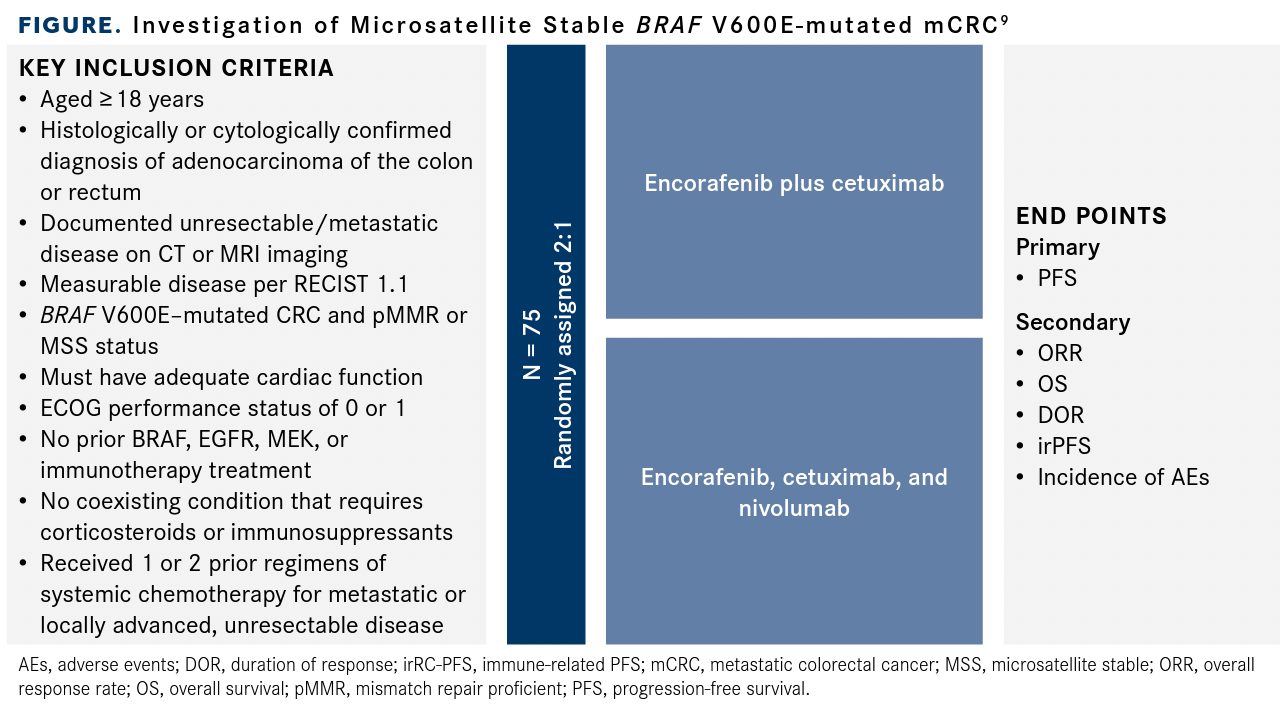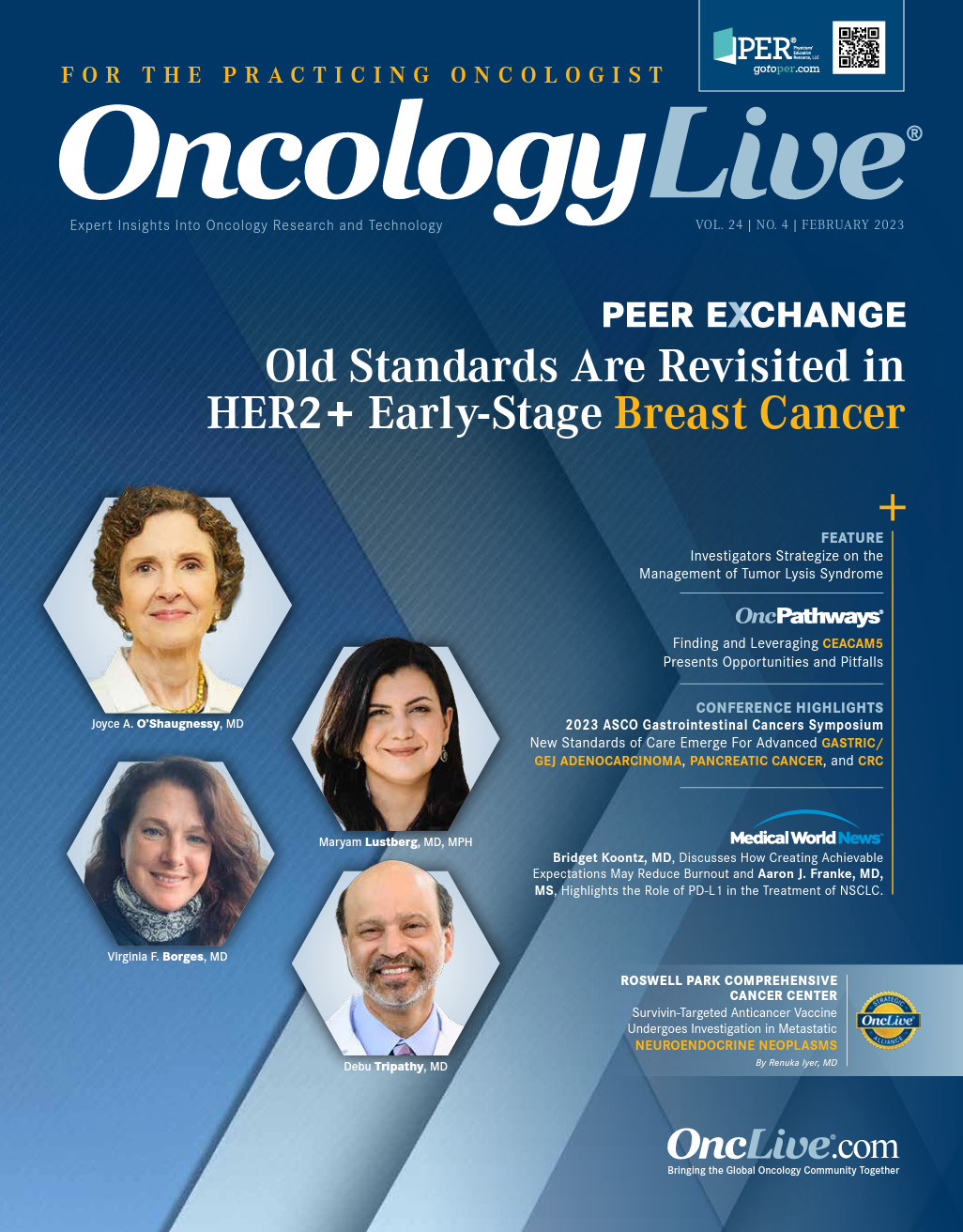Publication
Article
Triplet Regimen for Microsatellite Stable, BRAF V600E–Mutant mCRC Aims to Build Upon SOC
Author(s):
Because a positive correlation has been shown between expression of PD-L1 and BRAF V600E mutations in CRC, several combination therapies with checkpoint inhibitors and targeted agents are currently being explored.
Van Karlyle Morris, MD

The phase 3 BEACON CRC trial (NCT02928224) served as a landmark study introducing a new standard of care (SOC)— encorafenib (Braftovi) plus cetuximab (Erbitux)—for patients with previously treated microsatellite stable (MSS) BRAF V600E metastatic colorectal cancer (mCRC). Now investigators have set their sights on further improving outcomes with the addition of a third agent, nivolumab (Opdivo).1,2 Because a positive correlation has been shown between expression of PD-L1 and BRAF V600E mutations in CRC, several combination therapies with checkpoint inhibitors and targeted agents are currently being explored.3
Following first-line therapy with cytotoxic chemotherapy plus bevacizumab (Avastin), therapy with the BRAF inhibitor encorafenib plus the EGFR inhibitor cetuximab is the subsequent SOC treatment for this subgroup of patients.4 The addition of the PD-1 immune checkpoint inhibitor nivolumab has demonstrated early promising efficacy and safety data and will be explored in a recently launched phase 2 SWOG 2107 trial (NCT05308446).
“BRAF mutations occur in approximately 8% to 10% of all patients with mCRC,” Van Karlyle Morris, MD, said in an interview with OncLive®. “MSS BRAF-mutated CRC by numbers probably [occurs] more than the microsatellite instability–high mismatch repair–deficient population— it’s a sizable number of patients who have this [disease].” Morris is an associate professor in the Department of Gastrointestinal Medical Oncology in the Division of Cancer Medicine at The University of Texas MD Anderson Cancer Center in Houston.
“Unfortunately for these patients, this is among the most aggressive subpopulations of patients with mCRC, and we know that chemotherapy is not as effective [in this group],” he said. “Most recently, the phase 3 BEACON trial did demonstrate an improvement in survival outcomes with encorafenib and cetuximab [for these patients, but] median progression-free survival [PFS] was only 4 months, and the overall response rate [ORR] was approximately 20%. BEACON was a step forward, [but] it was a small step forward.”
The optimal first-line therapy for patients with MSS BRAF V600E–mutant mCRC remains unknown.5 MSS BRAF V600E mutations are characteristics that are associated with higher immune activation compared with MSS BRAF wild-type.4,5 Investigators have suggested that these “cold” tumors do not responds to immunotherapy treatment, but acknowledge that limited data exist for combination strategies in this population.6 Patients with MSS disease have a poor prognosis and standard cytotoxic combinations as well as monotherapy treatments have provided limited efficacy, resulting in a large unmet need for this subgroup of patients. 4,5
Preclinical models of MSS BRAF V600E–mutant CRC demonstrated that tumors may be primed for response to immunotherapy by inhibiting BRAF and EGFR, which cause a loss of expression in mismatch repair genes and promote an microsatellite instability–high phenotype.2 BRAF inhibitors alone are an ineffective treatment because signal upregulation via the EGFR occurs, making it necessary to include an EGFR inhibitor in care.5 To further improve outcomes by suppressing other possible downstream effectors in the MAPK pathway, inhibitors such as MEK and PI3K are being investigated in addition to nivolumab to expand on findings from the BEACON CRC trial.5 This treatment strategy is based on melanoma therapies and similar to earlier trials that evaluated targeting BRAF in metastatic CRC.3
Expanding the Doublet's Efficacy
To begin assessing the role of PD-1 inhibition in MSS BRAF V600E-mutant CRC, a phase 1/2 trial (NCT04017650) is being conducted at MD Anderson Cancer Center by Morris and colleagues.
“We looked at this population of patients with MSS BRAF-mutated metastatic CRC, [and] treated them with the SWOG 2107 combination of encorafenib, cetuximab, and nivolumab,” Morris said. “We treated 26 patients [and] saw an overall response rate of 50%. We saw a median PFS of approximately 7.5 months, and approximately one-quarter of the patients on our study stayed on the trial for over 1 year. When you think about this very poor prognostic subpopulation of patients staying on a well-tolerated treatment for 1 year, that’s unprecedented and hasn’t been seen before.”
Results presented at the 2022 American Society of Clinical Oncology Gastrointestinal Cancers Symposium demonstrated that at a median follow-up of 16.3 months (95% CI, 6.9-not applicable [NA]), median overall survival with the triplet was 15.1 months (95% CI, 7.7-NA) compared with 9.3 months (95% CI, 8.0-11.3) with encorafenib and cetuximab alone. When assessed for PFS, the doublet had a median delay in disease progression of 4.2 months (95% CI, 3.7-5.4) vs 7.4 months (95% CI, 5.6-NA) with the triplet.8
Among the responders, the median duration of response was 7.7 months (95% CI, 3.8-NA) for patients treated with the triplet. Additionally, among 22 evaluable patients, all achieved a partial response, and the disease control rate was 96% (95% CI, 77%-100%). No dose-limiting toxicities occurred; however, 18% of patients experienced grade 3 or 4 treatment-related adverse effects (AEs). Grade 3 AEs included colitis, maculopapular rash, and leukocytosis, as well as elevated amylase/lipase in one patient experiencing a grade 4 event of myositis/myocarditis. Common AEs of any grade included headache (65%), nausea (35%), and maculopapular rash (31%).8
“We saw quite striking clinical outcomes on that trial, and [although] exciting, that was at MD Anderson, a single-institution trial, so we’re moving this forward to a randomized trial to test more formally the difference between encorafenib/cetuximab, the current standard alone, or with the addition of nivolumab,” Morris said.
Further Evaluation in SWOG 2107
On the heels of these promising prior results, SWOG 2107 is seeking to enroll approximately 75 patients to further evaluate the triplet therapy vs the SOC doublet in this patient population (FIGURE 9). Patients must have unresectable or metastatic adenocarcinoma of the colon/rectum and must have received 1 to 2 prior lines of treatment for mCRC but not been treated with BRAF, EGFR, or MEK inhibitors or immunotherapies.2,9
FIGURE. Investigation of Microsatellite Stable BRAF V600E-mutated mCRC

Investigators hypothesize that adding nivolumab will result in an improved median PFS of 7.3 months using 80% power and a 1-sided α level of .10. They will compare this against the anticipated outcome with the SOC, which has a median PFS of 4.2 months and overall response rate of 20%.2
Patients in the investigative arm of the trial will receive encorafenib once daily orally at 300 mg on days 1 through 28, cetuximab intravenously (IV) at 500 mg/m2 on days 1 and 15, and nivolumab IV at 480 mg on day 1. Patients in the control arm will receive the same doses of encorafenib once daily orally on days 1 through 28 and cetuximab IV on days 1 and 15. The cycles are to repeat every 28 days until disease progression or unacceptable toxicity, and tissue and blood specimen banking will also occur for future correlative studies.2,9
The primary end point is to compare PFS per RECIST 1.1 criteria in the 2 arms, and secondary objectives include comparing overall response rate, overall survival, duration of response, safety, and tolerability and assessing immune- related PFS. The final analysis of PFS is planned for all eligible patients after 66 PFS events occur in the intention-to-treat population. The study was activated in the United States in June 2022; as of January 2023, 8 patients were enrolled.2,9
“We recognize there’s this huge unmet need to do better for our patients with MSS BRAF-mutated CRC,” Morris said. “If this trial is positive, this can move forward to potentially a larger hopefully registration study, we’ll have to see, but it could mean that there’s a well- tolerated triplet therapy that is extending survival outcomes for this group who, as it stands right now, don’t have many effective options for their treatment.”
References
- Tabernero J, Grothey A, Van Cutsem E, et al. Encorafenib plus cetuximab as a new standard of care for previously treated BRAF V600E-mutant metastatic colorectal cancer: updated survival results and subgroup analyses from the BEACON study. J Clin Oncol. 2021;39(4):273-284. doi:10.1200/JCO.20.02088
- Morris VK, Guthrie KA, Kopetz S, et al. Randomized phase II trial of encorafenib and cetuximab with or without nivolumab for patients with previously treated, microsatellite stable, BRAFV600E metastatic and/or unresectable colorectal cancer: SWOG S2107. J Clin Oncol. 2023;41(suppl 4):TPS265. doi:10.1200/JCO.2023.41.4_suppl.TPS265
- Mauri G, Bonazzina E, Amatu A, et al. The evolutionary landscape of treatment for BRAFV600E mutant metastatic colorectal cancer. Cancers (Basel). 2021;13(1):137. doi:10.3390/cancers13010137
- Ciombor KK, Strickler JH, Bekaii-Saab TS, Yaeger R. BRAF-mutated advanced colorectal cancer: a rapidly changing therapeutic landscape. J Clin Oncol. 2022;40(24):2706-2715. doi:10.1200/JCO.21.02541
- Tabernero J, Ros J, Élez E. The evolving treatment landscape in BRAF-V600E-mutated metastatic colorectal cancer. Am Soc Clin Oncol Educ Book. 2022;42:1-10. doi:10.1200/EDBK_349561
- Fang C, Lin J, Zhang T, et al. Metastatic colorectal cancer patient with microsatellite stability and BRAFV600E mutation showed a complete metabolic response to PD-1 blockade and bevacizumab: a case report. Front Oncol. 2021;11:652394. doi:10.3389/fonc.2021.652394
- Encorafenib, cetuximab, and nivolumab in treating patients with microsatellite stable, BRAFV600E mutated unresectable or metastatic colorectal cancer. ClinicalTrials.gov. Updated September 2, 2022. Accessed January 27, 2023. https://clinicaltrials.gov/ct2/show/ NCT04017650
- Morris VK, Parseghian CM, Escano M, et al. Phase I/II trial of encorafenib, cetuximab, and nivolumab in patients with microsatellite stable, BRAF V600E metastatic colorectal cancer. J Clin Oncol. 2022;40(suppl 4):12. doi:10.1200/JCO.2022.40.4_suppl.012
- Testing the addition of nivolumab to standard treatment for patients with metastatic or unresectable colorectal cancer that have a BRAF mutation. ClinicalTrials.gov. Updated January 31, 2023. Accessed January 31, 2023. https://www.clinicaltrials.gov/ct2/show/ NCT05308446









